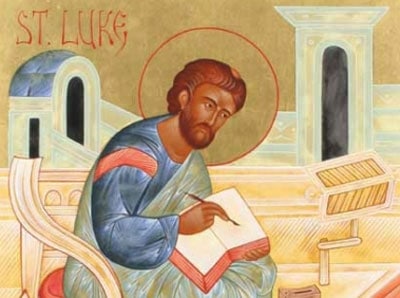
Luke the Historian
Dr. Stephen Nichols is joined by Dr. Guy Waters to introduce us to Luke the historian.
Stephen Nichols (SN): Today, we here at 5 Minutes in Church History welcome Dr. Guy Waters. Dr. Waters is professor of New Testament at Reformed Theological Seminary in Jackson, Miss. And he has a book coming out soon—a commentary on the Acts of the Apostles. Now, who is the author of Acts, Dr. Waters?
Guy Waters (GW): That would be Luke.
SN: Now, another question. Who is your favorite historian?
GW: I’m going to have to say Luke.
 SN: This is a good reminder regarding the inspiration of the Bible. The biblical authors, writing under the inspiration of the Holy Spirit, wrote God’s inerrant revelation to us. But they were also people, human instruments whose backgrounds and personalities God used in recording His revelation. In Luke’s case, it strikes me as I read Luke and Acts that he’s a careful historian. Would you like to tell us a little bit about Luke as an historian?
SN: This is a good reminder regarding the inspiration of the Bible. The biblical authors, writing under the inspiration of the Holy Spirit, wrote God’s inerrant revelation to us. But they were also people, human instruments whose backgrounds and personalities God used in recording His revelation. In Luke’s case, it strikes me as I read Luke and Acts that he’s a careful historian. Would you like to tell us a little bit about Luke as an historian?
GW: I think when you read Acts and you read the gospel of Luke (because they are a two-volume work intended to be read together, a seamless composition), Luke was a man of incredible literary skill. He was also a very careful historian. One of the striking things to me is that Luke lets on in the course of Acts that he on occasion traveled with the Apostle Paul. You’ll notice that sometimes he shifts from the third person—they did this, they went here, etc.—to the first person—we did this, we went here, and so on. So Luke was not only a man who was chronicling events, but he was experiencing them.
SN: He was an eyewitness to these things; he had firsthand experience of traveling with Paul.
GW: That’s right. And what’s striking is that Luke’s care as a historian has been vindicated by research. He’s come under some pretty heavy scrutiny but he’s always been vindicated. Whether it’s the title of an official or the geographical detail, Luke always comes out shining. So he was a meticulous historian. He was very careful.
SN: Luke had a sense of what he was writing. His gospel is a chronicle of Christ, and Acts is a chronicle of the church that picks up once Christ ascends into heaven. The weight of the task caused Luke to take his work very seriously in terms of getting things right.
GW: Exactly. I think one of the most important verses for the study of Acts is chapter 1, v. 8, where Jesus just before His ascension tells the Apostles that the gospel is going to go from Jerusalem to Judea and Samaria and the ends of the earth. And that is a momentous event when the gospel crosses that threshold definitively and decisively. And so Luke was witnessing something that was epoch-making. And so it’s a tribute to him that he took his task so seriously. He took such care to ensure that we would have a faithful record of one of the most important movements in history.
SN: A lot of folks call him “Dr. Luke” and assume that Dr. Luke has some medical training. Do you have any thoughts on that?
GW: Paul does refer to Luke at the end of Colossians as “Luke the beloved physician.” So it seems that he had some medical training, and there have been efforts to discern indications of his medical background from Acts. That’s not been altogether successful or persuasive. But medical people are often very attuned to detail. And so, in the providence of God, that training prepared Luke to be the careful and meticulous historian that he showed himself to be.
Stay connected with 5 Minutes in Church History by getting the weekly podcast on iTunes, SoundCloud, or via RSS. You can also subscribe to the blog via RSS and follow us on Twitter and Facebook.
(This podcast is by Ligonier Ministries. Discovered by Christian Podcast Central and our community — copyright is owned by the publisher, not Christian Podcast Central, and audio is streamed directly from their servers.)